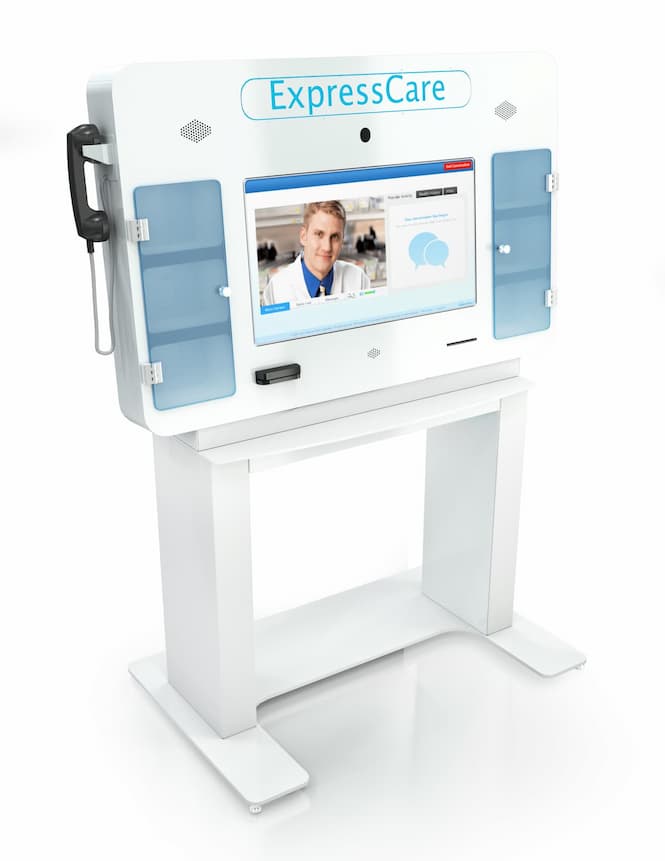Telehealth Kiosk Industry View
Learn about telehealth kiosk. We have been working in healthcare and telehealth for over 20 years. We monitor telehealth kiosk news in this area. For more information contact [email protected] — A Telehealth kiosk is a type of self-service kiosk that provides remote healthcare services, including non-clinical services, reminders, monitoring and training, administrative meetings, and continuing education. They are designed to reduce the risk of transmission and improve patient follow-through and health outcomes.
Opinion
It’s worth noting that along with its lower cost, per patient, telehealth makes it possible for your doctor at your clinic see 30 patients instead of 10. For health operators like Optum (parent company UnitedHealth worth noting), that is an equation they embrace. Doctors though are becoming less enamored with shorter visits and many more shorter visits. Many good doctors are leaving the “organized practice” and setting up shop independently. That means lower quality doctors at the clinic. No doubt that explains the rush to AI by healthcare EHRs like Epic and others.
I-Telehealth is a member of the Industry Group. For more kiosk information visit kioskindustry.org
Latest Telehealth Kiosk News Posts
- Telehealth Kiosk News – Teladoc Historic Net Loss Reported
- School-Based Telehealth Los Angeles
- Smart TV Telehealth Coming To Smart TVs by Samsung
- VA Telehealth Standards – Health Care Professionals Practicing Via Telehealth
- Telehealth Abortion Challenges With Latest Ruling
Latest Telehealth Kiosk News
Recommended
- VA Patient EHR Proposal to Terminate Oracle Contract
- Elotouch Healthcare Solutions
- VA Accessibility Issues – Visually Impaired Patients
- ADA ABA Retail Restaurants Regulations – 2023
About Telehealth Kiosk
Telehealth kiosks are interactive, self-service machines that provide clinical support to patients without requiring an in-person visit. They are equipped with high-quality cameras, diagnostic tools, and video screens that allow patients to communicate with a health care provider in real-time. Telehealth kiosks can offer a convenient and affordable alternative to traditional health care settings, especially for people who live in remote areas, have limited access to transportation, or face long wait times at clinics.
Telehealth kiosks can provide a range of services, such as:
- Primary and urgent care: Telehealth kiosks can diagnose and treat common conditions, such as coughs, colds, infections, allergies, rashes, and minor injuries. They can also monitor chronic conditions, such as diabetes, hypertension, and asthma, and provide follow-up care after surgery or hospitalization.
- Prescription and over-the-counter medications: Telehealth kiosks can dispense most medications on the spot, eliminating the need for a separate trip to the pharmacy. Some kiosks can also provide vaccinations and other preventive care.
- Health education and counseling: Telehealth kiosks can offer information and advice on various health topics, such as nutrition, fitness, mental health, and substance abuse. They can also connect patients with counselors, therapists, and support groups.
- Administrative and financial services: Telehealth kiosks can help patients with scheduling appointments, filling out forms, verifying insurance, and paying bills.
Telehealth kiosks have several benefits for both patients and providers, such as:
- Increased access and convenience: Telehealth kiosks can extend the reach of health care to underserved populations and locations, such as rural areas, workplaces, schools, airports, and malls. They can also reduce travel time and costs, and offer flexible hours and no appointment needed.
- Improved quality and outcomes: Telehealth kiosks can provide personalized and interactive care, with real-time feedback and guidance from certified clinicians. They can also collect and store vital signs and medical records, and facilitate referrals and coordination of care.
- Reduced costs and risks: Telehealth kiosks can lower the overhead and operational costs of health care delivery, and pass on the savings to patients and payers. They can also prevent unnecessary visits to emergency rooms and reduce the exposure and transmission of infectious diseases.
Telehealth kiosks are part of the growing trend of telemedicine, which involves the use of electronic communications and software to provide clinical services remotely. Telemedicine is often referred to as virtual care, and it can include phone calls, video chats, mobile apps, online portals, and wearable devices. Telemedicine kiosks are one of the most advanced and comprehensive forms of telemedicine, as they combine the convenience of self-service with the quality of face-to-face care. Telemedicine kiosks are transforming health care by making it more accessible, affordable, and effective for everyone.
Telehealth Statistics
- According to the CDC, 37% of adults in the U.S. used telemedicine in the past 12 months as of 202112.
- In 2021, telehealth was used by 13% to 17% of American patients, depending on the type of service3.
- By the year 2023, the telehealth industry is expected to climb to $194.1 billion in market value, up from $61.4 billion in 20193.
- The use of virtual care is 38 times higher than before the COVID-19 pandemic, which prompted policy changes and increased demand for remote health care3.
If you want to learn more about telehealth, you can check out these links:
- Trends in the Use of Telehealth During the Emergence of the COVID-19 Pandemic — United States, January–March 2020
- Telemedicine Use Among Adults: United States, 2021
- 49 Telehealth Statistics & Telemedicine Trends
